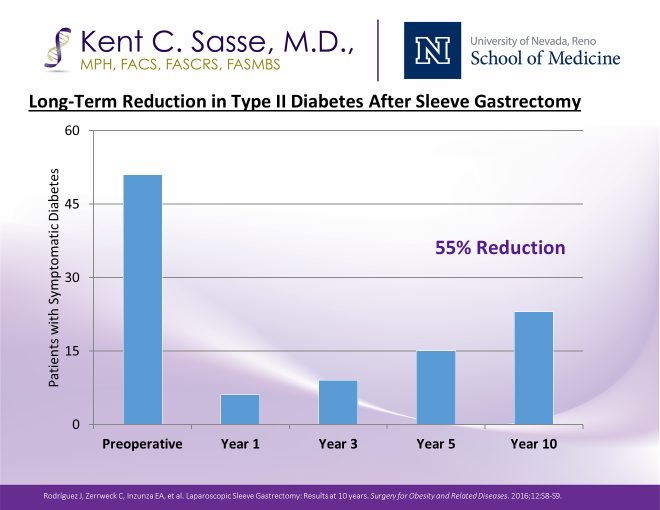Among the patients who had type two diabetes before surgery, the vast majority experienced complete remission at year 1, and then as the years passed, diabetes gradually returned in a minority of the patients. But even 10 years after surgery, there was still a persistent 55% reduction in the number of people who were considered to have diabetes, compared to before surgery.
 Laparoscopic sleeve gastrectomy (LSG) remains the safest, and most effective treatment of type two diabetes among individuals with obesity. That includes treatment with medications, injections, insulin, etc. In the last five years our LSG patient population of more than 1,500 people have enjoyed a mortality rate of 0.0% and a risk of the major complication of leak at 0.0%. Because the weight loss and diabetes remission rates are equivalent to gastric bypass, but the safety record is better and complications lower, sleeve gastrectomy remains the best treatment for most people with obesity and diabetes.
For people who do develop a recurrence of diabetes or weight regain years later, the sleeve procedure is highly compatible with a simple surgical revision involving the duodenum (SADI procedure) that once again creates remission of diabetes and massive weight loss without an invasive surgery.
]]>
Laparoscopic sleeve gastrectomy (LSG) remains the safest, and most effective treatment of type two diabetes among individuals with obesity. That includes treatment with medications, injections, insulin, etc. In the last five years our LSG patient population of more than 1,500 people have enjoyed a mortality rate of 0.0% and a risk of the major complication of leak at 0.0%. Because the weight loss and diabetes remission rates are equivalent to gastric bypass, but the safety record is better and complications lower, sleeve gastrectomy remains the best treatment for most people with obesity and diabetes.
For people who do develop a recurrence of diabetes or weight regain years later, the sleeve procedure is highly compatible with a simple surgical revision involving the duodenum (SADI procedure) that once again creates remission of diabetes and massive weight loss without an invasive surgery.
]]>
Similar Recent Posts
“Are Incontinence Medications Ineffective? Solutions Explained”

When incontinence medications don’t work, explore other treatments. Get insight on bladder control issues, alternatives to drugs, and management of incontinence.
Is Bariatric Surgery in Mexico Safe?

Mexico isn’t the best bet for bariatric surgery. Get insights on safety, care standards, and risks before you consider overseas weight loss surgery.
Avoid Foods for Incontinence: Which Items to Skip?

“Avoid foods for incontinence to improve bladder control. Our guide breaks down dietary changes, bladder irritants, and bladder-friendly foods. “
